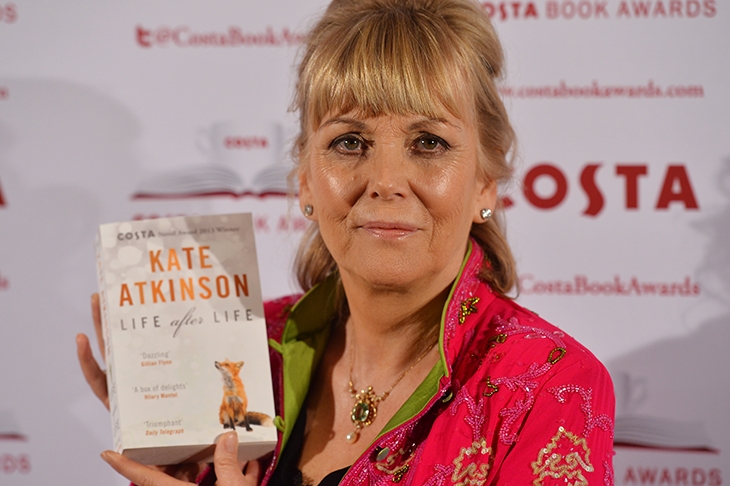Transcription, Kate Atkinson’s 11th novel, sees her returning to the detective fiction she honed in her series about Jackson Brodie, the haunted private eye who, after the murder of his young sister, chased the killers of girls. It also pursues some of the themes of her more recent fictions, Life After Life and A God in Ruins, which explored the ambiguities of war, and questions of chance and fate, with lives played out in multiple permutations. There is, however, no professional detective in Transcription. Instead it falls to an ordinary young woman to fathom the meaning of her life and, by extension, what it means to be caught in the net of history.
This time around it’s not so much life after life, but aftermath and afterlife that Atkinson is concerned with, making the point that our lives are not tidily parcelled but extend beyond moments of drama into periods of consequence and reckoning. Bookended by two brief scenes in 1981, Transcription jumps between 1940, when a newly orphaned, 18-year-old Juliet Armstrong is recruited as a typist into MI5, and a decade later when she’s working as a producer of children’s radio programmes for the BBC. In the later period she finds people long thought dead, abroad, in prison, or simply gone from her life, returning to haunt her. Is this her imagination running away with her — the thing Perry, her boss at MI5 repeatedly warned against? Or should the threatening notes she’s been receiving be taken seriously?
Contained in this predicament is the question Atkinson wants us to consider: what does it mean to be a good reader — of her book, of course, but also of the world? The transcriptions Juliet makes are of secretly recorded conversations between English fifth columnists — disaffected aristocrats, ‘frustrated housewives’ — and Godfrey Toby, someone they believe to be a Gestapo agent, but who in fact works for MI5. These transcripts run throughout the book, alerting the reader to the details we often miss and the information we misconstrue. Juliet is held to be proficient at her job precisely because she has an active imagination (despite his warnings, she casts Perry in the role of her romantic lead) and compared to other transcribers is good at filling in the gaps. But how accurate is her version of events, and indeed how accurately do we read Juliet? The job is made harder by the fact that at both MI5 and the BBC (organisations, Juliet notes, which swap personnel with remarkable ease) everyone seems to be a copy, whether playing versions of themselves, performing in the Great Game as a spy, or acting in the children’s radio histories she keeps re-writing, trying to enliven and ennoble them.
Juliet’s name suggests a predetermined role in life but — not wanting to end up like one of Brodie’s doomed girls — she tries to avoid the fate it predicts. Understanding how the game works is the first step to self-preservation so, refusing to be hunted, Juliet chooses the role of hunter. This, though, is not easy. Perry’s rules (‘it’s in the details’, ‘don’t give too much away’) are useful in her apprenticeship as a spy and as a woman, yet even to him she rarely says what she means. Her undisclosed thoughts are bracketed like ghosts in the text, indicating an unspoken opposite that seems like English irony, but which also has a touch of the dialectic. The endless role-playing, however, makes it hard to detect which ‘side’ anyone is on and, therefore, who they are opposed to. Often the signs are ambivalent: M15’s rationale for killing people in the name of a ‘greater good’ looks like fascist instrumentalism; the BBC’s pretence that there are no sides in history, broadcasting programmes with ‘Serfs galore (quite happy — most unlikely)’, resembles authoritarian propaganda. Even the record of fifth columnists that Juliet tries to recover is confusingly called The Red Book, and while the vileness of anti-Semitism is a given, it is not at all clear that ‘This England’ — at least as an idea — is worth fighting for.
Amid all this Atkinson creates a contemporary version of a ripping good yarn (nudging us to the realisation with references to John Buchan and Erskine Childers). Her trick is to combine propulsive plot with a high degree of self-consciousness, and in Transcription the fiction comes with a skin so thin it is almost transparent. What she reveals of its inner working is a novel full of smoke and mirrors, of artifice and redirection in which all that is solid melts into air — quite literally in the case of Godfrey Toby: ‘the mist closed around him once more and he disappeared’. Toby, perhaps a double or even triple agent, turns out to be, like ‘This England’, an enigmatic construct.
And Juliet lives long enough to understand that the red books of either side have more in common than we once imagined. As she lies dying she hopes her son will understand, ‘Nothing mattered, and this was a freedom, not a burden.’ What matters are not the red books, strong-arming us into preordained plots, Atkinson seems to be suggesting, but how sceptically we read.






Comments